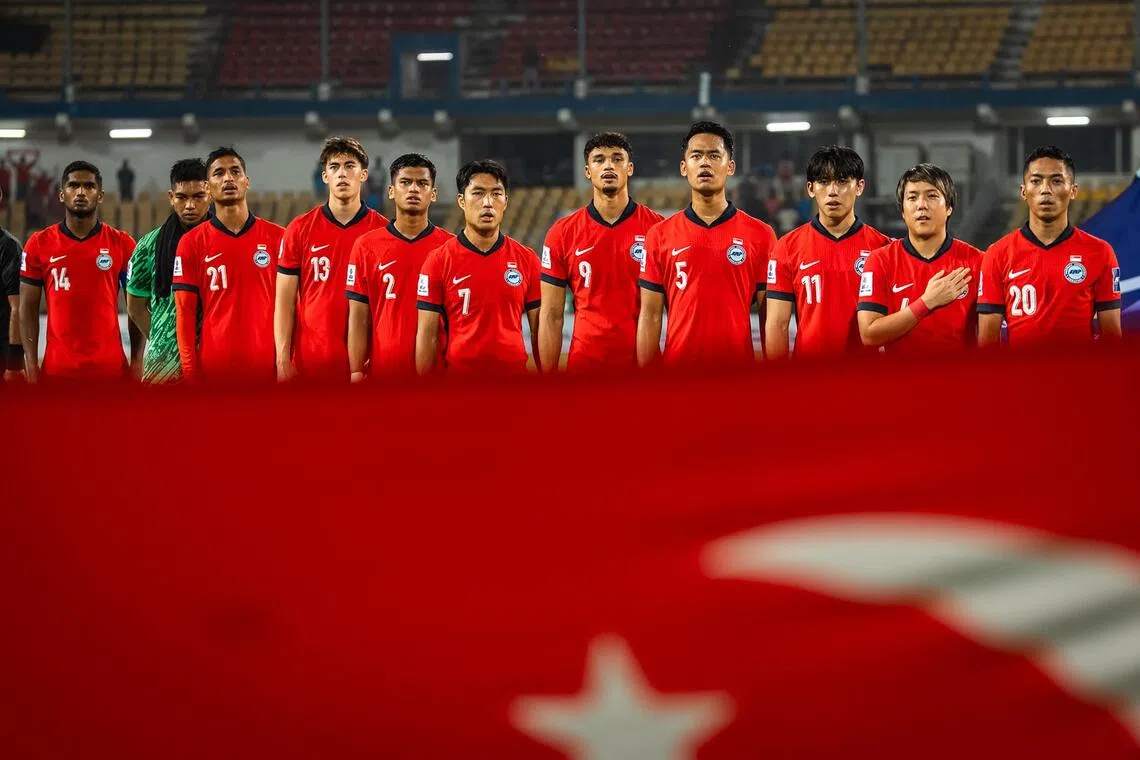The Big Question: Why does the Asian Cup matter for Singapore football?
In this series, The Straits Times takes a deep dive into the hottest sports topic or debate of the hour. From Lamine Yamal’s status as the next big thing to pickleball’s growth, we’ll ask The Big Question to set you thinking, and talking.
Sign up now: Get the biggest sports news in your inbox

The Lions singing the national anthem before their 2-1 Asian Cup qualifying win at India on Oct 14.
PHOTO: FOOTBALL ASSOCIATION OF SINGAPORE
Follow topic:
- Singapore are close to 2027 Asian Cup qualification, needing a win in Hong Kong on Nov 18 to progress.
- Asian Cup qualification would boost Singapore football and inspire future generations of footballers and fans.
- Qualification would also justify the significant investment in football and provide a signpost for the Unleash The Roar! project.
AI generated
SINGAPORE – For all of Singapore football’s failures, which have seen a 13-year trophy drought at senior level, the 158th-ranked Lions are now just a win away from one of their biggest achievements after beating world No. 134 India away
The task is daunting. Taking on 146th-ranked Hong Kong at Kai Tak Sports Park on Nov 18, only the winners will progress to the 2027 Asian Cup in Saudi Arabia. Draw, and it goes to their final Group C qualifier on March 31, when Singapore host Bangladesh and Hong Kong travel to India, with the Lions needing to better Hong Kong’s result.
After several near-misses for the 1996, 2011 and 2023 editions – the Lions competed in the 1984 edition as hosts – why is it so important for Singapore football to secure a historic Asian Cup berth?
Breaking the glass ceiling
In the 1980s, Japan were still losing to the likes of Malaysia and Thailand and had not played at the World Cup or Asian Cup. But after qualifying for their first Asian Cup in 1988, they have improved by leaps and bounds, winning the continental showpiece a record four times.
Similarly, after their first World Cup in 1998, the Samurai Blue have made the last 16 four times. They have appeared at every World Cup and Asian Cup since, and in recent years, they have proven to be an international force
Despite being Asean champions four times, Singapore have never qualified for a major tournament. Qualifying for the Asian Cup will inject belief into the players and fraternity that it is possible to earn a spot among the continent’s best teams, just like how their first regional trophy at the 1998 Tiger Cup led to three more Asean titles.
Former Lions coach Tsutomu Ogura, now Japan Football Association’s technical committee vice-chairman, told The Straits Times: “Turning zero into one is the most difficult task we face. Japan worked hard to improve over the last 30 years. Even with the success now, we don’t stop because if we wait, another team will come and take our place.
“Our success did not come in a day, and so it is possible that Singapore football can get there, if we work together in the right direction. To achieve this, Singapore must come together and support the team, which will surely give them courage and hope.”
Interim Lions coach Gavin Lee
For all the pipe dreams about World Cup qualification – with Goal 2010 and subsequently an aspiration for 2034 – reaching the Asian Cup can provide a milestone for what is a long journey to grander ambitions like the Finals.
Singapore skipper Hariss Harun said: “It is a process. It’s still a bit of a distance for us, but right now, we have smaller goals on the road to bigger goals. Let’s take it one step at a time. We have Asian Cup qualification in our own hands now, but we are not there yet, and we need to stay focused and keep working hard.”
Restoring fans’ faith
Football remains one of the few sports that can fill the 55,000-seater National Stadium, though local fans have not been out in droves for the Lions in recent times. In their 1-1 home draw against India
Once record champions in the region with four Asean titles, Singapore football has been in the doldrums in the last decade. The Lions’ Fifa ranking dipped to an all-time low of 173rd in 2017 and while they are currently ranked 158th, they are behind regional rivals such as Thailand (101st), Vietnam (114th), Indonesia (119th), Malaysia (123rd), and the Philippines (143rd).
The results at age-group levels – from Under-16s to Under-22s – are also bleak. At the 2023 SEA Games, the Under-22s suffered their worst defeat in the football competition since 1971 after a 7-0 drubbing by Malaysia, as they ended their campaign without a single victory.
In a comment on The Straits Times Sports’ Instagram post, @jjarryll wrote: “Can SG climb and do better so we can actually go watch our own soccer matches?”
@aiverntan added: “They have 1 decent game every quarter, and we are supposed to care about the national team.”
There is a whole other debate about whether fans should support their national team through thick and thin, but a consistently successful side will inevitably attract more supporters.
Lee said: “Every game we have an opportunity to try to win over a few more people, and that’s what we really want to do. Hopefully one day, we can get back to something we have experienced before, and our job now is to try to take that step forward every single time.”
Getting a return on investment
With a $28.88 million grant for 2025 from national sports agency Sport Singapore, football continues to be the nation’s most well-funded sport. In comparison, other major sports like aquatics and table tennis received around $8.35 million and $5.04 million respectively for the same period.
This invariably attracts envious glances from national sports associations which have developed world champions and medallists at major Games. Over the years, some have griped about why the Football Association of Singapore deserves such financial backing despite the lack of success.
James Walton, sports business group leader of Deloitte Asia Pacific and South-east Asia, noted that Asian Cup qualification would provide justification for the investment.
He said: “When you look at the money being spent on other sports like aquatics, table tennis or badminton, and their results in terms of medals and participation in major Games, obviously football has come in for criticism and scrutiny, even to the extent of ‘Should the Young Lions even be going to the SEA Games?’
“Hence, qualifying for the Asian Cup would be such a massive boost, and it would show that some of the activities of the Unleash the Roar! (UTR) initiative are heading in the right direction and there’s some momentum.
“Most importantly, it would just be a massive boost to the ecosystem – clubs, academies, supporters. Everybody involved in Singapore football will have something to be proud of and that will provide a massive lift. Regardless of commercial benefits, and I hope it will lead to more sponsorships, to have that positivity back in Singapore football would be priceless.”
A signpost for Unleash The Roar!
Launched in 2021, the UTR is a national project
Through the UTR, aspiring young players get support and development opportunities through various avenues, such as overseas scholarships, the Singapore Youth League and the School Football Academy to set them up for success.
But young footballers also need a goal to work towards at the senior level, and the possibility of playing at the Asian Cup, as well as the challenge of doing better than their predecessors, would give them a prestigious but realistic target.
Harith Danish, a 16-year-old Young Lions midfielder who made his Singapore Premier League debut in September, said: “To be able to have Singapore at the 2027 Asian Cup playing against the likes of Japan, South Korea and Saudi Arabia will signal to Singaporeans and the rest of Asia that we belong there.
“This belief will serve as motivation for us at youth level, to know that our seniors did it and to work hard to follow in their footsteps and even surpass them. We want to push our limits in every training session, maintain the standard they have set, and continue raising the level of Singapore football.”
Do you think Singapore will qualify for the Asian Cup? Why do you think it is important for the Lions to qualify for a major tournament? Let us know on our Instagram page
@straits_times_sport


